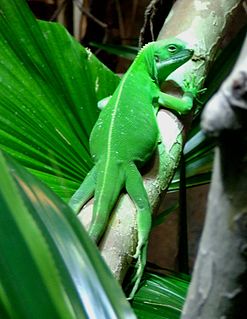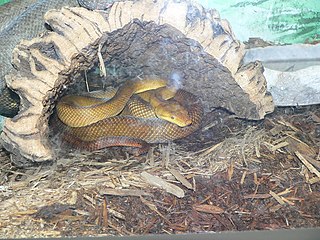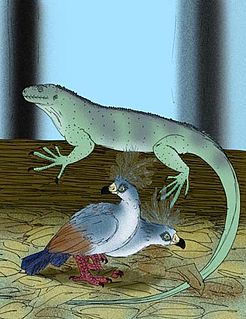 W
WThe genus Brachylophus consists of four extant iguanid species native to the islands of Fiji and a giant extinct species from Tonga in the South West Pacific. One of the extant species, B. fasciatus, is also present on Tonga, where it has apparently been introduced by humans.
 W
WBrachylophus bulabula is a species of iguanid lizard endemic to some of the larger central and northwestern islands of Fiji, where it occurs in Fijian wet forest. It was described by a team led by a scientist from the Australian National University in 2008. It is one of the few species of iguana found outside of the New World and one of the most geographically isolated members of the family Iguanidae. Initially also reported from Gau Island, in 2017 this population was described as a separate species, B. gau.
 W
WBrachylophus fasciatus, the Lau banded iguana, is an arboreal species of lizard endemic to the Lau Islands of the eastern part of the Fijian archipelago. It is also found in Tonga, where it was probably introduced by humans. It is one of the few species of iguanas found outside of the New World and one of the most geographically isolated members of the family Iguanidae. Populations of these iguanas have been declining over the past century due to habitat destruction, and more significantly, the introduction of mongoose and house cats to the islands.
 W
WCandoia bibroni is a nonvenomous boa species endemic to Melanesia and Polynesia. Two subspecies are currently recognized, including the nominate subspecies described here.
 W
WEmoia impar, also known as the dark-bellied copper-striped skink, or the azure-tailed skink is a species of skink that is widespread in the Pacific, especially Polynesia and Micronesia.
 W
WThe Gau iguana is a species of iguana endemic to Gau Island in the Fijian archipelago. It mostly lives in the well-preserved upland forests of the island, with smaller populations in the degraded coastal forests. It can be distinguished from other South Pacific iguanas by the male's distinctive color pattern and solid green throat. It is also the smallest of all South Pacific iguanas, being about 13% smaller than the third smallest species and 40% smaller than the largest extant species.
 W
WHemiphyllodactylus typus, also known as the Indopacific tree gecko, Indopacific slender gecko, or common dwarf gecko, is a species of gecko found in South Asia, Southeast Asia, and East Asia, and some islands in the Indian and Pacific Oceans.
 W
WThe Fiji crested iguana or Fijian crested iguana is a critically endangered species of iguana native to some of the northwestern islands of the Fijiian archipelago, where it is found in dry forest on Yaduataba, Yadua, Macuata, Yaquaga, Devuilau, Malolo, Monu and Monuriki.
 W
WLapitiguana impensa is an extinct giant iguanid from Fiji. It probably became extinct following the human colonization of Fiji 3000 years ago.